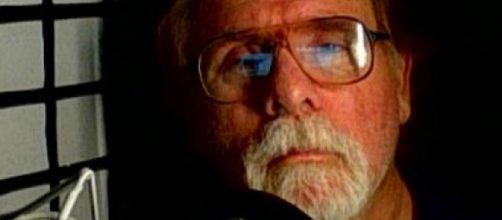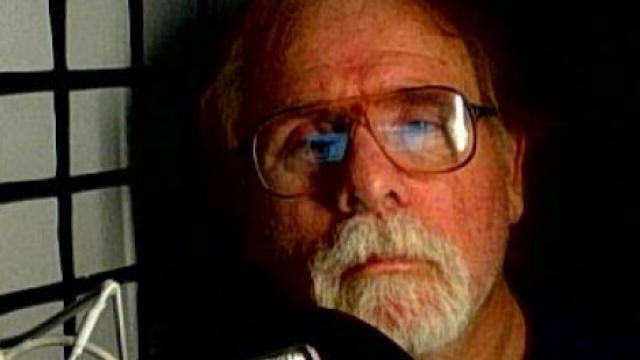Otis Jiry is a smooth-voiced narrator who gained acclaim working with Chilling Tales for Dark Nights, a YouTube channel owned by Chilling Entertainment that seeks to bring the best short-form English-language horror stories to the public. Affectionately dubbed “the white Morgan Freedman” for his deep and velvety voice, Otis Jiry quickly became one of the most beloved narrators on the channel. He was so in-demand, in fact, that he soon started his own YouTube channel which currently has over 34,000 subscribers.
Yet for all the joy that Otis’ voice has brought to others, his life circumstances have often been far from idyllic.
A woodworker by trade, Otis’ ability to carve was drastically impaired when he was badly injured in an equipment accident. His mangled hand made it impossible for him to continue physical labor and, during this time, Otis earned financial support via the popularity of his YouTube audio readings. His personal life, meanwhile, was also filled with strife due to a dysfunctional relationship with his now ex-wife. One altercation in 2005 resulted in Otis garnering a domestic dispute charge which, subsequently, resulted in the recent revoking of his green-card status. Thirteen years after the incident, Otis is now being forced to return to his native Canada after living in America for nearly two decades.
Job searches, radio work, and 'Go Fund Me'
Given the short-notice nature of the deportation, Otis worried about finding housing and securing a job upon returning to Canada. The possibility of ending up homeless worried Otis so much that he took to YouTube, uncharacteristically asking his fans to make donations to a GoFundMe campaign titled “Send Otis Home” which was started by a friend and collaborator.
“I always considered going back to Canada after my divorce was finalized,” Otis explained via email on July 17, “just not in this way. Due to the charge I have, the green card got revoked when I tried to renew it. Since it got denied, I have to leave U.S. soil.”
While Otis regards his current situation as both unfortunate and embarrassing, he recognizes that Canada offers some incredible opportunities.
The country contains numerous art guilds, community service programs, and affordable housing options—even though Vancouver is quite expensive on the whole. Otis is currently looking into finding a job as a woodworker but, given his injuries, a career where he uses his voice more than his hands is much more desirable. In fact, Otis previously worked as a news journalist who covered sports. Having a background as a recording engineer, he also worked with commercial productions and served as a voice-over artist on several advertisements. He also enjoyed a position as an on-air sports anchor and reporter. Returning to this kind of work upon returning to Canada is an avenue that Otis is presently exploring.
“One of my old radio colleagues has suggested possibly teaching at BCIT where I went to school for radio,” Otis explained. “That would be very cool and much easier on me than building cabinets at this stage. We'll see how that goes.”
While he is maintaining an upbeat and positive attitude, Otis is wary about transporting himself, his two pet cats, and as many personal belongings as he can gather into a shipping container and making his way up north to his native Vancouver. The circumstances involving his forced departure from the United States might be indicative of America’s recent immigration crackdown, but it is also a source of great personal guilt.
On the YouTube video he recorded and released in early July to inform his followers of his plight, Otis noted that he is extremely sorry about what happened all those years ago and acknowledged that he made a stupid mistake.
It took courage to make such a video, yet his fans responded with nothing but positivity and support. As of mid-July, his GoFundMe has raised over 5,000 dollars and many good wishes.
“I was very surprised and overwhelmed by the support I received since I didn't expect it to be like that,” Otis stated and noted that the support had been a wonderful crutch during such a difficult time in his life.
Luckily for Otis, Canada is one of the most progressive countries on earth with many social and affordable housing programs that seek to benefit people who are in unsavory situations. Staff members at Recovery Through the Arts, Arts Umbrella, Alliance for Art and Culture, and Pacifica Housing were extremely responsive and helpful when contacted via email regarding Otis’ situation.
They offered support and/or links to other organizations that might be able to assist him in getting back on his feet. While Otis has yet to secure housing for himself and his two cats—and garner steady employment—he is hopeful that he will make progress before arriving in Canada in early August.
“I know it is about a five-day drive from Baton Rouge to Vancouver,” Otis explained and noted he initially decided to leave Louisiana on July 28. “I was planning on using a U-Haul to transport everything, but my vehicle isn’t capable of pulling a trailer of the weight involved, so I need to have my booth shipped to Canada by a commercial truck which is a $1000 cost. Besides, I thought about it and figured that bringing my truck across the border would be too much of a hassle with customs, so I’m going to go by plane.”
Otis noted that he is attempting to sell as many of his possessions as he can before crossing the border into Canada.
While initial sales were slow, things are now picking up, and he is selling much of his woodworking equipment, furniture, and more.
Housing, advice, and YouTube uploads
Otis plans to use all the money he garners from sales and the GoFundMe campaign towards securing a hotel room where he will stay with his cats until he can find permanent housing. While he has been diligent in contacting social outreach programs in Vancouver, there is seemingly little they can do for him until he actually arrives in the country and schedules a meeting with staff members. He also plans to continue recording and posting storytelling videos on YouTube whilst looking for a steady job. Although YouTube might not pay a living wage, it is something and, in a situation such as this, every penny is important.
“As for my YouTube uploads, I don’t think there will be any difference really because I can do that from anywhere in the world thanks to the digital era,” Otis said. “Ideally, I will be able to find house voice-over talent work, with some recording engineering tossed in, but I don't think that exists! Most likely, I'll look at doing woodworking as a cabinetmaker for a day job and continue with doing voice acting at night from home. It’s very scary not to know the immediate future, but I’m taking it one day at a time.”
While Otis is still largely unsure of exactly how the coming weeks and months will play out, he is hopeful that everything will go well, especially given the social programs in his native Canada and his large network of friends both offline and online.
When asked what words of advice he would give to others who find themselves in a similar situation, Otis declared: “Stay strong. It's scary, but as you work through it, you get a better idea of what's ahead.”



